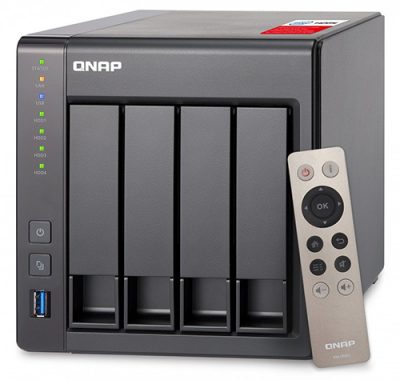Affiliate Disclosure: As an Amazon Associate I earn from qualifying purchases.
Having a 4 bay NAS (Network Attached Storage) generally offers greater total storage and more flexibility when it comes to setting up backups and redundancy. They are a fantastic network-based storage solution for any home network.
It can seem difficult shopping for the best NAS devices but it is made easier when you know exactly what you should be looking for. In this buyer’s guide, we’ll take a look at the key features you should be looking for in a NAS as well as my recommendations for the best 4 bay NAS devices for home use.
In a hurry?
If you don’t have much time, my favorite 4 bay NAS for home is the Synology 4 Bay NAS DiskStation DS418 for its performance, ease of use, storage options and flexibility when setting up redundancy.
The Comparison Table
[table id=25 /]
Best 4 Bay NAS for Home
1. Synology 4 Bay NAS DiskStation DS418
A fantastic all-rounder 4 bay NAS device for use at home is the DS418 from Synology.
The DS418 is powered by a new 64-bit quad-core processor which allows for excellent data transfer speeds in addition to 10-bit 4K H.265 video transcoding should you wish to stream 4K video files from it also.
This NAS allows easy access to your files anytime, regardless of where you are in the world. There are no complicated network settings to configure as the QuickConnect feature allows you to connect via a simple customizable address which can be accessed from any device without any additional charge.
You’ll be able to access all of your files, even when on the go, in a convenient and straightforward way.
The DS418 will support a maximum of 48TB of data (12TB hard drive x 4) which is an immense amount of storage, even for those with the biggest storage demands.
More hard drive bays also means more flexibility when it comes to setting up redundancy. The DS418 supports Synology’s hybrid raid in addition to JBOD, RAID 0, RAID 1, RAID 5, RAID 6, and RAID 10.
The Surveillance Station tool provides intelligent monitoring and video management tools such as the ability to manage multiple IP cameras with live streaming to help safeguard the most important areas of your home.
Synology has definitely built this NAS with home surveillance and security in mind.
One thing to note that the included documentation isn’t the best; much of it is vague and some features aren’t even mentioned. Thankfully, Synology tech support is on hand to point you in the direction of some excellent online instructions should you need it.
If the ability to store lots of data whilst having flexible redundancy options are what you need, the Synology DS418 NAS would make an excellent addition to your home network.
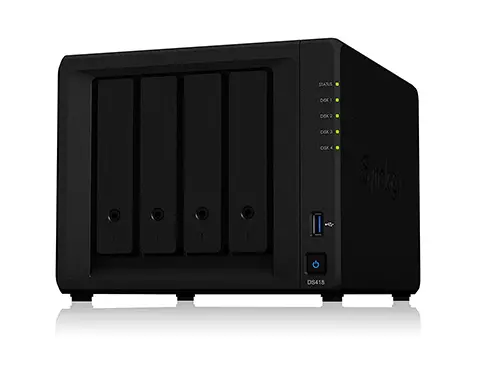
2. Synology 4 Bay NAS Rackstation RS819
If you are lucky enough to have a server or network rack as part of your home network, you may want to consider getting the only rack-mounted NAS featured on this list.
The NAS is only 1U and is less than 12 inches deep, so it should fit very nicely in most racks.
I am a bit of a neat freak myself, so if I could get all of my networking gear rack mounted to keep everything looking that bit tidier, I would.
A NAS is often something that unfortunately has to be left on the shelf due to their typical boxy design, but that is certainly not the case with the Synology RS819.
This NAS features a 64-bit quad-core 1.4GHz processor which delivers performance at over 224 MB/s for reading and 152 MB/s for writing.
File Station, the web-based management tool is both fast and secure. It provides easy to use drag and drop functionality that doesn’t require any complicated software either on PC or Mac.
Included in File Station are advanced search and filtering tools that make organizing and sharing your home media incredibly easy. The RS819 supports the following protocols for fantastic compatibility: AFP, FTP, iSCSI, NFS, SMB and WebDAV.
The built-in security tools are also constantly updated by Synology to keep your data safe and protect your NAS for evolving threats.
The Synology RS819 offers a versatile solution for storing your data and managing your files. You will struggle to find a rack-mountable alternative for the price and the quality that Synology delivers here.

3. QNAP TS-451+
This 4 bay NAS by QNAP certainly packs a punch in terms of performance despite being relatively small and compact.
It features a quad-core 2.0 GHz CPU, 2GB of DDR3 RAM, two Gigabit Ethernet ports and an HDMI port for an external video and audio connection. The RAM is even upgradeable with a maximum of 8GB being accepted should you want that extra bit of performance.
The built-in Virtualization Station feature allows you to run multiple virtual machines, be them Windows, Linux, UNIX or Android. This allows you to have a play around and do some testing with operating systems you may not be used to in a controlled environment without affecting your main workstation.
In regards to media streaming, the TS-451+ allows you to play 1080p videos and experience 7.1 channel audio directly from the NAS thanks to the HDMI port and bundled remote control. The remote really does make navigating menus and playing your content much easier.
That’s not to say that HDMI is the only option for media streaming. You can also stream via DLNA, Airplay, Chromecast, and Bluetooth with the Multi-Zone multimedia control.
In terms of performance, you can expect the TS-451+ to deliver 225 MB/s read and write speeds. It will even automatically increase the processor’s clock speed from 2.0 GHz to 2.42 GHz when needed for particularly CPU intensive tasks.
Backing up your files is made incredibly easy with this NAS. It really is as simple as uploading and downloading your files whenever needed, and it can be done remotely.
Setting up snapshots for backups of your backups is also a straightforward process, and the Qsync feature will sync your files across all of your devices.
Some people have reported that the initial setup was not as straightforward as expected, and the instructions for all of the different features are scarce and only describe the basics. You may need to do a bit more research online in order to take full advantage of this NAS.
Others have said that the TS-451+ can take quite a long time to boot, and the interface can be quite slow and cumbersome to navigate.
That being said, this NAS by QNAP does deliver strong performance for the price and is good value for money, in my opinion.
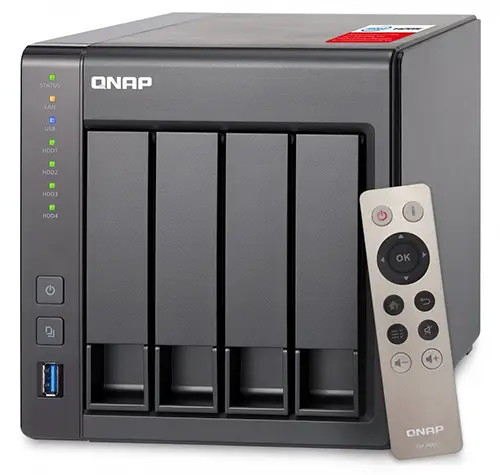
4. TerraMaster F4-210
If you are looking for a more budget-friendly, entry-level NAS to use within your home network, the TerraMaster F4-210 is a very affordable option to consider.
It doesn’t deliver the absolute best performance, but for the price, it is very reasonable. The F4-210 features a quad-core 1.4 GHz CPU with 1GB RAM which is not upgradeable. You can expect to receive read and write speeds of around 114 MB/s.
The F4-210 is compatible with 3.5” and 2.5” SATA hard drives and 2.5” SATA SSDs. Each bay supports up to 16TB disks with a maximum capacity of 64TB. Just bear in mind that the total storage available to you will depend on the RAID configuration you decide to use.
Speaking of RAID configurations, this NAS will support RAID 0, RAID 1, RAID 5, RAID 6, RAID 10, JBOD and Single. As you can see, you certainly have flexibility in how you wish to set up your NAS for redundancy.
The F4-210 is fantastic for multimedia streaming with full support for Emby and Plex, allowing you to bring all of your videos, music, and photos together into a single, easy to access location. You can even quickly access the NAS and all of your content through the TNAS app which is available on both iOS and Android.
A variety of backup methods are also available for that extra peace of mind that your data is safe. The F4-210 supports Apple Time Machine, Rsync and Remote Backup in addition to third-party backup solutions like Cloud Sync.
There is also a USB 3.0 port to support external backup storage, with a wide host of drive formats being supported such as EXT4, FAT, and NTFS.
If you are looking for a simple to use and affordable 4 bay NAS to get you started, the TerraMaster F4-210 is a great option to consider. It may not provide the same performance as some of the other NAS devices featured on this list, but for simple file storage and basic home media streaming, it will do the job well.
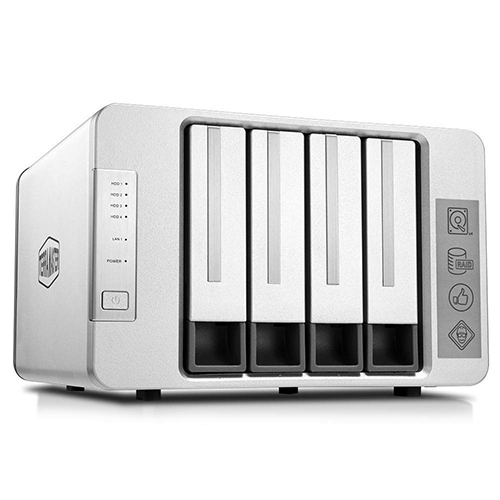
5. Buffalo TeraStation 3410DN
The main reason for featuring the TeraStation 3410DN by Buffalo on this list of best 4 bay NAS devices is thanks to it including four hard drives with the NAS itself.
These drives have been pre-tested and are suitable for use in a NAS, and have even had RAID configured before even arriving on your doorstep. This saves you the time, and possibly extra money, in having to go out and purchase compatible drives separately.
Whilst on the topic of the included drives, with a total capacity of 8TB, each drive has a capacity of 2TB and they ship in a RAID 5 configuration. This provides you with 6TB of usable storage whilst still having redundancy in place.
Should you wish to, you can set your drives to use RAID 0 instead to make use of the full 8TB capacity, but you will lose the data protection provided by the mirroring and parity. I would, therefore, recommend sticking with the RAID 5 configuration.
Performance-wise, the 3410DN features a quad-core processor running at 1.4 GHz with 1 GB of RAM. Again, these specs aren’t as good as some of the others featured on this list, but you will inevitably have to pay more if you want a better performing NAS.
For extra backups, Buffalo provides functionality to backup your data between the 3410DN and an offsite cloud solution such as Dropbox or Microsoft’s OneDrive. With this, you get the best of both a public and a private storage solution.
Purchasing the 3410DN does qualify you for Buffalo’s data recovery service should you need help with simple logical data issues. Just bear in mind that you need to register your NAS on Buffalo’s website to take advantage of this.
Some people have reported that the 3410DN can be quite noisy, especially when under heavy load, and the available software and features are limited, especially when compared to rival brands such as Synology.
If you want a 4 bay NAS to simply plugin and start using, the Buffalo TeraStation is a good option, but you may find purchasing a diskless NAS and then buying the hard drives separately offers better value for money and potentially better performance.
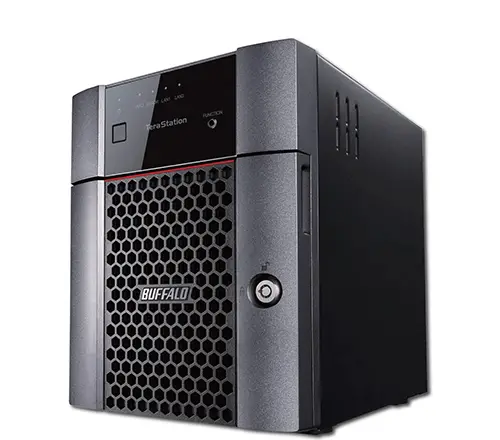
Buyer’s Guide
Choosing the right NAS for your needs can be a daunting task with the vast choice that is available. Before purchasing a new NAS, ask yourself the following questions to ensure you choose one that is suitable for your needs:
- How much storage do I need?
- Does the NAS store backups and support redundancy?
- How many hard drive bays do I need?
- Do I need hard drives to be included?
- Which hard drives should I use?
- What connections and controls do I need?
- Do I need remote access?
-
How Much Storage Do I Need?
The NAS devices we cover in this article will come with enough storage to fit the needs of most people, but you still want to look ahead and consider how much storage you will need not just now, but also in the future.
High-resolution photo and video files, in particular, can take up a large amount of storage, so you want to make sure you have enough available and not have to keep deleting files or moving them elsewhere in order to make space.
That defeats the object of having a NAS in the first place: having a central and secure place to store all of your data.
You may also like: Best NAS for Home Media Streaming: Buyer’s Guide
-
Does the NAS Store Backups and Support Redundancy?
The best NAS devices should also be more than just a storage solution; they should also have the capability of storing backups and supporting redundancy should anything ever happen to your original files.
Redundancy allows you to mirror the data stored on one hard drive to another, so should one fail, the data is still kept safe on the mirrored drive.
There are many different RAID configurations you can set up on a NAS, but which ones are available to you depends on how many hard drive bays you have, and how many hard drives you have to fill them.
-
How Many Hard Drive Bays Do I Need?
This leads us to ask the question of how many hard drives do you need the NAS device to hold. Many NAS devices are able to hold more than one hard drive, which I consider to be essential for redundancy.
You don’t want to put all of your eggs in one basket and rely on a single hard drive. Having multiple hard drives installed in the NAS makes data management and setting up backups and redundancy much easier.
The more hard drive bays you have, the greater the flexibility you have in terms of RAID configurations. For example, having just two bays available limits you to RAID 0 or RAID 1, whereas having four bays allows you to use RAID 5, RAID 6, and RAID 10 as well.
-
Do I Need Hard Drives to Be Included?
Although most NAS devices come “diskless”, meaning you have to purchase the hard drives themselves separately, some will come pre-populated with disks and are often already formatted to use a particular RAID configuration.
The NAS manufacturers who also produce hard drives will favor selling NAS devices with pre-populated drives as it is a sale for both the NAS and hard drives in a single transaction.
Other manufacturers are more likely to sell their NAS devices without any included hard drives, but some will offer included disks that are pre-configured for the convenience of you, the buyer.
Before making a decision on whether to go diskless or pre-populated, I would suggest checking the difference in how much it will cost you overall.
Some people may be willing to pay more for pre-populated NAS for the convenience of knowing you can plug it in and start using it straight away, whereas others will find that purchasing the drives separately is more cost-effective in addition to getting better performance and more overall storage.
-
Which Hard Drives Should I Use?
If you already have a stash of hard drives you are looking to insert into a NAS, you need to first make sure they are compatible and will physically fit.
NAS manufacturers will typically recommend certain models of hard drives that have been tested and confirmed as compatible with their product, but that’s not to say your existing hard drives won’t work.
If you are buying new hard drives specifically for your NAS, I would suggest going with the manufacturer’s recommendations for peace of mind that they will be compatible, more than anything.
Some hard drives will be branded specifically for use with NAS.
This may appear as just a marketing tactic to get you to spend more money on a hard drive, but most of these have actually been tested to run 24 hours a day, 7 days a week, 365 days a year.
Also, keep in mind the physical size of hard drives and whether they will fit in the NAS you are looking to purchase. Some NAS devices will accept multiple sizes of hard drives, including SSDs, whereas others will only allow the commonly found 3.5” SATA drives.
-
What Connections Do I Need?
Something else to consider when shopping for your next NAS is the connections and controls they have available.
Most devices will have a couple of USB ports allowing you to connect a printer or external storage device, for example. This allows you to essentially make these devices available on your home network through the NAS itself.
Any NAS device you look at will come with at least one Ethernet port in order to be connected to a network, but some of the higher-end models may have two for redundancy. Pay top dollar and may find you even get a 10 Gigabit Ethernet port for blistering fast write and read speeds.
Some models of NAS will come with an HDMI port to allow you to connect it to an external display, but this isn’t as important when you can access the NAS through a web-based interface anyway.
In terms of physical buttons, some devices will have a “copy” button which is designed to make copying the contents of an external storage device, such as a USB flash drive, to the NAS with just the press of a button.
-
Do I Need Remote Access?
Most NAS devices provide the functionality to send web-based links to others, allowing them remote access to certain files and folders that are stored on your NAS.
The NAS essentially becomes your private cloud-based storage solution.
One benefit of this is that you no longer have to rely on another service such as Google Drive, DropBox or iCloud which charge you a monthly fee whilst offering less storage capacity.
It’s no surprise that NAS manufacturers make a particular point to advertise this feature when “personal” and “cloud-based” are such buzzwords these days.
In addition to being able to share files and folders over the Internet, you also have the ability to access your NAS wherever you are in the world providing you have an Internet connection. Gone are the days where you have to be on your local home network in order to access your files.
Most NAS devices nowadays will offer this feature, but definitely don’t assume they do and make a point to check before pulling the trigger. For some, a NAS isn’t worth having if they can’t access it remotely, which is the opinion I also share.
Final Thoughts
These are the best 4 bay NAS devices for home I have found that strike a good balance between performance, storage and redundancy to make a perfect repository for all of your files and media.
When choosing a NAS, remember to consider how much total storage you may need, not just now but also in the future, whether it stores backups and supports redundancy, and how many hard drives you may also need to buy as most will not come with drives included.
If I were to recommend one of the NAS devices featured on this list, it would have to be the Synology 4 Bay NAS DiskStation DS418.
I feel that it offers the best value for money in regards to performance, total storage capacity, options for redundancy, and features.
Whether you are looking to stream media from your NAS or simply want a safe, secure and easy to access data management solution, the DS418 would make an excellent addition to your home network.
